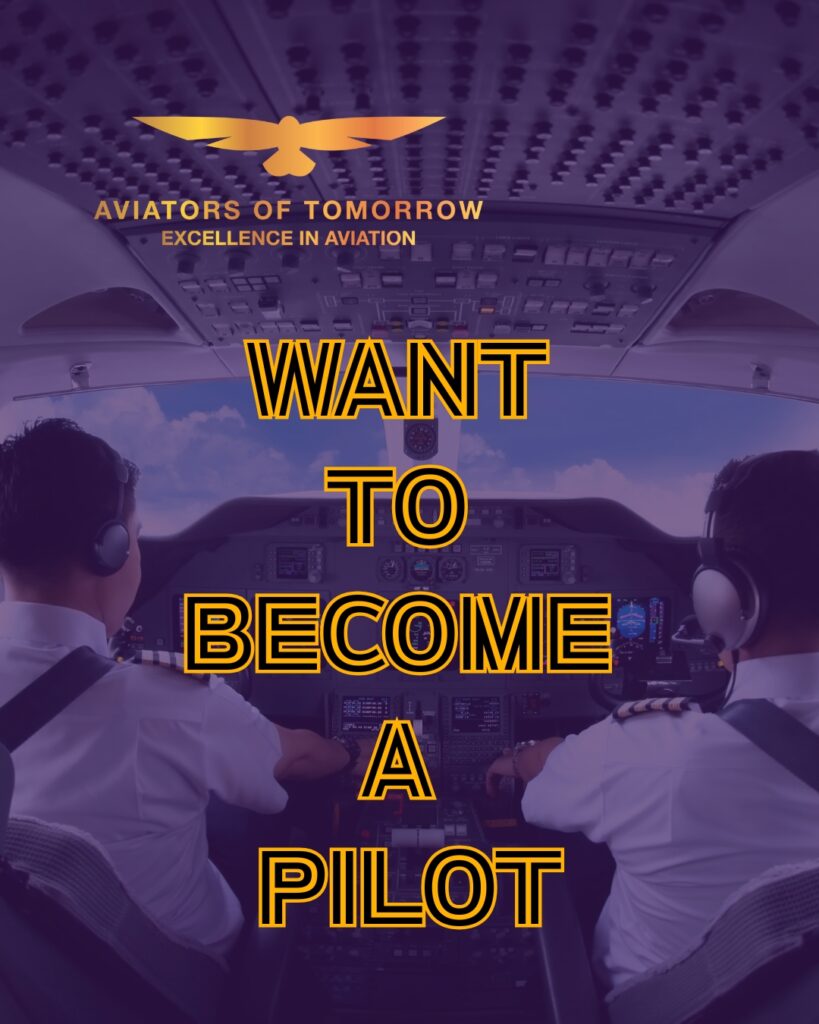For many students, the dream to become a pilot starts in childhood. Watching airplanes take off, seeing pilots in their crisp uniforms, and imagining yourself in the cockpit can be inspiring. But when the time comes to choose this career, questions about costs, eligibility, exams, and medical requirements can feel overwhelming.
This Q&A guide is written for students to explain everything they need to know if they want to become a pilot in India
Table of Contents

1. To become a pilot, what stream should I choose?
If you are still in school and planning your career, the most important step is subject selection. If you want to become a pilot, you must take the Science stream with Physics and Mathematics (PCM) in Class 12. These subjects are essential because pilots use them daily, Physics helps explain aerodynamics, while Mathematics is used for navigation and flight calculations.
If you don’t take PCM initially, don’t worry. You can still study Mathematics later through NIOS (National Institute of Open Schooling) to stay eligible.
To gain more knowledge about this, you may read our blog “Which stream is best for becoming a pilot.”
2. How much does it cost if you want to become a pilot?
One of the most common questions students ask is about the cost to become a pilot. The truth is, pilot training is expensive. On average:
- Flying Training & CPL: ₹40–60 lakhs
- Ground Classes & Exams: ₹1–2 lakhs
- Type Rating (airline-specific training): ₹15-20 lakhs
So, the total cost can reach ₹50–80 lakhs depending on where you train. Some students choose to train abroad, which may cost more but can sometimes be faster.
3. Can a student from a non-science stream become a pilot?
Yes, students from commerce or arts streams can also become a pilot. However, you must have Physics and Mathematics at the Class 12 level. If you didn’t study them in school, you can take them separately through NIOS or another recognized board. Once you clear these subjects, you’re eligible to begin pilot training.
4. What is DGCA Class 2 Medical and why is it required if you want to become a pilot?
To start flying training, you must pass the DGCA Class 2 Medical. It’s the first step if you want to become a pilot and ensures you are fit for training. Doctors will check your eyesight, hearing, blood pressure, heart health, and overall fitness. If you pass, you can apply for a Student Pilot License (SPL) and start your first lessons in the cockpit.
For more information about DGCA Class 2 Medical you may read our blog “DGCA Class 2 Medical 2026: Complete Guide“
5. What is DGCA Class 1 Medical?
Before you can work in airlines, you need to pass the DGCA Class 1 Medical. This is a more advanced test that every student must clear if they want to become a pilot professionally. It includes lung function tests, ECG, vision tests, hearing tests, and general health checks. Airlines require this certificate before hiring pilots.
For more information about DGCA Class 1 Medical you may read our blog “DGCA Class 1 Medical: Complete Guide“
6. Which exams are required for commercial pilot training admissions?
To become a pilot, you must pass several DGCA exams. These include:
- Air Navigation – for flight planning and calculations.
- Meteorology – to understand weather patterns and safety.
- Air Regulations – rules of the air and aviation laws.
- Technical General – aircraft systems and technical knowledge.
- RTR (Radio Telephony Restricted License) – for communication procedures and handling radios.
These exams may seem tough, but with proper training and ground classes, students can clear them successfully if they want to become a pilot.
7. Can I become a pilot if I have PCB, not PCM?
Yes, but you will need Mathematics. If you studied PCB (Physics, Chemistry, Biology) without Mathematics, you can still become a pilot by completing Mathematics separately through NIOS or another recognized board. This ensures eligibility for those who want to become a pilot but didn’t take PCM.
8. What medical and age rules apply if you want to become a pilot?
If you want to become a pilot in India, you must meet:
- Age Requirement: At least 17 years old to start flying and 18 years old to apply for a CPL.
- Medical Requirement: Pass DGCA Class 2 initially and DGCA Class 1 before CPL issuance.
Don’t worry if you wear glasses, most students with mild vision issues can still qualify if they want to become a pilot.
If you’re trying to make sense of all this information, you don’t have to do it alone. Fill out the form below, and our experts will help you with clear guidance.
Stand a chance to win 100% scholarship & start training with India’s trusted aviation institute. Apply & Check Eligibility.
Apply Now!9. What are pilot salaries in India?
The salary after you become a pilot is one of the biggest attractions of this career:
- Fresh CPL holders (after type rating): ₹1.5–3 lakhs/month.
- Co-pilots in domestic airlines: ₹3–6 lakhs/month.
- Captains in major airlines: ₹8–10 lakhs/month or even more.
Salaries increase with experience, and international airlines may pay more than Indian airlines.
For more information you may read our blog “Pilot Salary in India: A Complete Guide 2026“
10. What are DGCA ground classes, and why are they important?
Ground classes are the “theory” side of training. If you want to become a pilot, you can’t just learn to fly — you also need to study. Ground classes cover Navigation, Meteorology, Regulations, and Technical subjects. These prepare you for DGCA exams and make you confident in both flying and safety.
You also need to study. Ground classes cover Navigation, Meteorology, Regulations, and Technical subjects. These prepare you for DGCA exams and make you confident in both flying and safety.
To know more about DGCA ground classes, you may read our blog “DGCA Ground Classes: The Foundation of Every Pilot’s Journey”
11. What is the fee for the aviation course if you want to become a pilot?
The total fee to become a pilot depends on where and how you train:
- Ground Classes: ₹2–3 lakhs
- Flying Training (200 hours): ₹35–50 lakhs
- Type Rating: ₹15–20 lakhs
If you add everything together, the complete cost is around ₹50–80 lakhs for students who want to become a pilot.
12. What is the difference between SPL and CPL?
Two important licenses you need if you want to become a pilot are:
- SPL (Student Pilot License): Your first license, which allows you to fly under instructor supervision.
- CPL (Commercial Pilot License): The license that makes you a professional pilot and allows you to fly passengers or cargo for airlines.
13. Procedure to apply for DGCA Class 2 Medical
- Register on the DGCA eGCA portal.
- Choose an approved doctor.
- Complete basic health checks.
- If fit, you’ll receive the certificate and can begin your flight training.
14. Procedure to apply for DGCA Class 1 Medical
- Apply on the DGCA eGCA portal.
- Select an approved medical center.
- Undergo detailed medical tests like ECG, blood tests, lung function, and eyesight etc.
- Once cleared, you are officially eligible to become a pilot in airlines.
15. Why is Aviators of Tomorrow the best institute to become a pilot?
Choosing the right institute is the final step in your journey to becoming a pilot. Aviators of Tomorrow is a top choice for students because:
- Trainers are experienced airline pilots.
- Modern simulators and advanced aircraft are available.
- DGCA-approved syllabus ensures exam success.
- Strong track record of student placements in airlines.
Conclusion
The journey is exciting if you want to become a pilot, but it requires careful planning. From choosing PCM in school, to passing DGCA exams, to clearing medicals and completing flying hours, every step brings you closer to the cockpit.
Yes, it requires dedication and investment, but once you become a pilot, you enter a career full of respect, high salaries, and endless opportunities to explore the skies.
For students with the passion and determination who want to become a pilot, the dream is absolutely achievable, the sky is waiting for you.
Fill out the form below and get clear guidance for your pilot career.
Stand a chance to win 100% scholarship & start training with India’s trusted aviation institute. Apply & Check Eligibility.
Apply Now!
